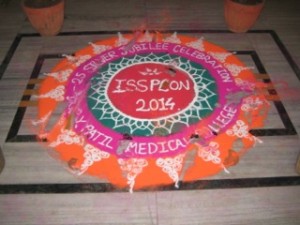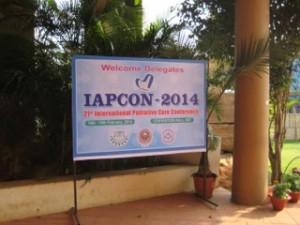
In a briefing note published in 2009, the World Health Organization estimated ‘that 5 billion people… have no or insufficient access to treatment for moderate to severe pain’ . Much of the dialogue related to this lack of access has focused on the availability of the opioid drug morphine, but despite several high profile initiatives there has been limited change on a global scale. India is one of several countries where this is particularly problematic and so, my research, as a PhD student (based at the University of Glasgow), is to examine the practice of pain management in India, and to try to unravel some of the reasons for this apparent lack of progress.
My research
I currently work as an anaesthetic consultant in the British NHS, but I travelled to India this February to collect data for my social science PhD. I was to attend conferences of both the Indian Association for the Study of Pain (ISSP), in Mumbai and the Indian Association Palliative Care (IAPC) in the city of Bhubaneswar, Odisha. There I would attempt to find willing pain specialists working across the country in varying clinical areas, in order to audio record interviews detailing their work. I felt I had planned my trip with meticulous detail. I had gained research ethics approval and had even done a fact finding trip to the conferences a year earlier. But when I left the UK I was still anxious and very unsure as to how my work and requests for participation in my study would be received. My fears were unfounded – and I received incredible generosity of time and interest, and hospitality, at both conferences.
ISSP conference, Mumbai
The ISSP conference was held at Dr D.Y. Patil Medical College, Nerul, with great facilities, including a huge air conditioned lecture theatre and several parallel halls. Overall the conference was very well attended and seemed larger that the meeting I had attended the year before in Nagpur, perhaps reflecting the relatively large number of pain specialists practicing in Mumbai. The scientific programme, held over three days, consisted of plenary sessions interspersed with smaller workshops and lectures, with a choice of up to four different events. A broad range of pain management topics was covered, including psychological therapies, pharmacological treatments, and suggested strategies for education; but considerable time was also devoted to the discussion of interventional techniques. Notably, there were also some high profile overseas faculty, with both the President Elect of the International Association for the Study of Pain, Prof Rolf-Detlef Treede, and the British Pain Society’s Immediate Past President, Prof Richard Langford taking part in the conference.The scientific programme was preceded by a hands on, cadaveric workshop to teach various interventional pain management techniques. This well organised event appeared very popular with delegates, and was led by faculty from both India and overseas.
I was made to feel incredibly welcome at the meeting, with many people, generously allowing me to interview them. Although collecting this data was great fun and very interesting, the constant level of concentration required left me quite exhausted, and by the time the banquet evening came around on the evening of the second day, I was ready to let my hair down a little! The entertainment was unsurpassable with some fantastically enthusiastic singing and dancing from many, including Faculty members. An evening to be remembered.
IAPC conference, Bhubaneswar
By the time I arrived in Bhubaneswar, 10 days into my trip, I was feeling considerably more confident about my work. I had several interviews under my belt, so I was free to relax a little on my arrival and managed to see some of the beautiful temples for which the city is so famous. The slower pace of life of the city was also a welcome change from the incredible noise and congestion of Mumbai.
The IAPC conference, also held over three days, was in a similarly large venue, at Kalinga Institute of Industrial Technology. Although, I had attended this conference a year before, I was still struck by the huge size of the event. There must have been several hundred people attending with a notable number of participants and Faculty from overseas. In many ways I often felt the meeting was very similar to other national conferences I have attended in the UK and elsewhere, but of course without such stunning cultural entertainment, the wonderful food and the much more fun, if a little less predictable, commute between the hotel and the conference venue in an auto rickshaw.
The scientific programme of the IAPC conference was also set out with small parallel sessions, covering a large breadth of topics, ranging from music therapy, to the use of cannabinoids, to the neurobiology of pain. Plenary lectures tied the programme together, with some high profile international speakers such as Dr Jan Sternsward, Chief Cancer WHO Emeritus, and Dr Jim Cleary from the Pain and Policy Studies Group at the University of Wisconsin. Dr Stephen Connor from the Worldwide Palliative Care Alliance, presented a great overview of the recently published Global Atlas of Palliative Care at the End of Life, whic had been compiled with the involvement of one of my PhD supervisors, Professor David Clark. For me, it is always a great pleasure and honour to hear Dr MR Rajagopal speak and he did not disappoint with his summary of recent progress of opioid legislation, presented on the final morning of the conference. Dr Rajagopal leads the charity ‘Pallium India’ and has campaigned extensively to the Government of India to simplify the regulations surrounding the use of pain relieving medications like morphine. Stringent and highly bureaucratic legislation, designed to prevent illegal diversion of medication, has led to patients in pain being unable to receive access to effective, affordable pain relief. A recent amendment to this legislation has just been approved by the Indian Government and more detailed information on these developments is available at the Pallium India website.
Future plans?
Overall, I was struck by the enthusiasm and truly inspirational work of so many of the delegates and participants at both conferences, but for me the highlight of my trip was a debate on the final morning of the IAPC meeting, entitled ‘Developing palliative medicine is a threat to the corporate world of medicine and specialist physician’. There has of course been a considerable amount written and discussed globally, about the need to spread palliative care beyond those who are suffering from very advanced cancer, to other non-curable diseases. This debate however, demonstrated to me how this scenario could potentially evolve in India, where some clinicians consider there to be an even broader role for palliative care, as an all-encompassing healthcare system, a comprehensive, not-for-profit alternative to corporate medicine. It was a fascinating discussion, which has been presented in some detail on the ehospice website.
I left India greatly uplifted by the whole of my trip, and of course humbled by so much of the work others are undertaking in incredibly challenging environments. The limitations of the NHS seem incomparably small. Finally, of course, I am indebted to so many of those I met who generously shared with me their time, wisdom and hospitality. I am already excited about my plans to visit again next year when the conferences will be in the southern cities of Chennai and Hyderabad.
Dr Clare Roques is a PhD student in the School of Interdisciplinary Studies, University of Glasgow and can be reached at: c.roques1@research.gla.ac.uk




Please keep me updated with your fascinating research.
“…regulations surroundING…” Ante-penultimate paragraph.
Almost certainly a sub editor’s job.
You write really well.
Thank you Peter, typo corrected!